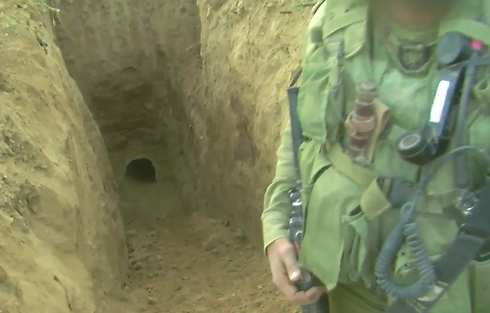

With no sanctions, Protective Edge mistakes will be repeated in the future
Analysis: The state comptroller’s report creates an illusion that it will set in motion a process of fixing the failures and the mistakes of the 2014 Gaza war. But although the IDF has drawn its own conclusions and will try to implement them while they are still fresh, the political echelon will likely show the same irresponsibility and reckless behavior in the next battle as well.
Nevertheless, it is unnecessary: First of all, because it includes no sanctions against the political echelon, which acted irresponsibly before and during the battle and is guilty of most of its failures; and second, because the report’s recommendations concerning the top military echelon are only recommendations and will not prevent the chief of staff from repeating the mistakes of the summer of 2014 in five or six years from now.
The report is damaging because it creates an illusion that it will set in motion a process of fixing the failures and the mistakes. Based on experience, it can firmly be determined that when it comes to the political echelon, that isn’t happening and it won’t happen either. Even before the report’s final draft was written, it was already used and is being used mainly as a taunting and PR tool in the political arena rather than as an outline for rectification.

The IDF actually drew some lessons—some of the report’s conclusions are based on the thorough investigations that the IDF initiated after Operation Protective Edge. But decades of experience show that the lessons drawn by the defense establishment from one battle or war are dissolved or disappear from its consciousness by the time the next battle or war takes place, and so on and so forth. Besides, as we know, to err is human and no one is immune to mistakes. Nevertheless, we must distinguish between human errors and manifestations of irresponsibility on security-related issues, which should be severely punished.
The findings of the comptroller’s report regarding each of the decision makers in Protective Edge can be summarized in three clauses. The report states that Prime Minister Benjamin Netanyahu and then-defense minister Moshe Ya’alon acted irresponsibly and neglected their duty by:
A. Failing to initiate and hold a thorough strategic discussion on the interests and national goals that the State of Israel wishes to achieve in relation to the Gaza Strip—through war or through diplomatic means, or through a combination of both. The prime minister’s duty was to initiate such a discussion according to alternatives that would be prepared by the National Security Council for him and the cabinet's other members. In practice, that didn’t happen. The cabinet discussed only one option—a military battle that would achieveme calmness and deterrence for as long as possible.
No other strategy was discussed—neither bringing down Hamas nor a massive economic reconstruction of the strip while bypassing Palestinian President Mahmoud Abbas and creating a third Palestinian entity that would stand to lose from a war with Israel. As a result, the army prepared operation plans matching the objective set by the political echelon. In other words, returning to the existing situation as soon as possible at the end of the military battle—until the next round.
B. The prime minister and the defense minister were well aware of the tunnel issue and had even defined it as a strategic problem since late 2013. They stated quite often during cabinet discussions that it was a serious problem that had to be taken care of. In practice, neither the defense minister nor the prime minister confirmed that the IDF was properly preparing to deal with it.
While the defense minister did issue an order—long before Operation Protective Edge—to spare no efforts or money in finding ways to locate and uncover terror tunnels, both Ya’alon and Netanyahu neglected the operational aspect. They didn’t demand that the army show them how tunnels are quickly destroyed during fighting, when one knows more or less where they are but is unfamiliar with their exact route. During Protective Edge, Ya’alon said that the operation would take several days, but it actually lasted several weeks.
C. The prime minister and defense minister kept critical information on the tunnels from the cabinet ministers, preventing them from making rational decisions on the matter during the first days of the battle. This fact, which was exposed by the state comptroller, stems from their arrogance towards the cabinet ministers, who did not serve in the elite Sayeret Matkal unit as they did, and from their justified fear that the minister would leak any juicy information they received to the media.
Cabinet ministers provided information to Hamas
The comptroller’s report presents extremely serious findings regarding all cabinet ministers, with no exception. The comptroller stresses in this context that neither the prime minister nor the defense minister are the ones who guide the army and present the objectives it must achieve, but rather the entire government, which delegates this authority and supreme responsibility to the cabinet. The report’s conclusions about the ministers, therefore, carry a special and extremely troubling meaning:
A. They did not demand a thorough strategic discussion on the State of Israel’s interests and national goals concerning the Gaza Strip. Had they done that, the comptroller implies, it might have been possible to prevent or postpone the eruption of the Protective Edge war. It should be noted that Ministers Gilad Erdan and Yuval Steinitz demanded strategic discussions, both on Gaza and on the tunnels, but they did not really insist and just let their demand fade away.
B. The cabinet ministers heard in 2013 from the prime minister, from the defense minister, from the chief of staff and from the military intelligence director that there was a tunnel problem. Some of them even visited tunnels that were uncovered that year, but none of them demanded a discussion on how the State of Israel, the IDF and the Shin Bet were preparing to actually deal with the problem. While Netanyahu told them in one of the discussions, long before Protective Edge, that it was a strategic problem, they heard him and remained indifferent.
Yes, even Minister Naftali Bennett, who remembered to demand a discussion on how to deal with the tunnels only on June 3, 2014—the day security forces found the bodies of the three kidnapped Jewish teens from Gush Etzion, and when the Shin Bet issued a concrete warning related to a specific tunnel a month before the operation. Even Bennett knew very well that there was a tunnel problem at least two years before he demanded a cabinet discussion on the matter.
C. The cabinet ministers did not have the background information required for making rational decisions on how to run the battle in Gaza—not just because Prime Minister Netanyahu and then-defense minister Ya'alon kept things from them, but also because they did not bother delving into the intelligence information at their disposal and did not study it.
D. Some of the cabinet members constantly leaked information from the cabinet discussions to the media, directly providing valuable information to the Hamas leadership. This information about the differences of opinion in the cabinet and about the prime minister and defense minister’s intentions, which reached Hamas, prolonged the war and led to military and civilian casualties.
IDF misjudged potential damage
As for the IDF, the comptroller’s conclusions are mixed. He points to quite a few mistakes and failures, mainly in the building of power to destroy the tunnels and in filling up its “bank” of targets before the battle. At the same time, he praises certain aspects in the use of force. For example, the intelligence information the forces went on the ground with, which was an important factor in reducing human losses among the soldiers.
The comptroller also rejects the Shin Bet’s claim that it had warned of a war in the summer of 2014. The report reveals that then-Chief of Staff Benny Gantz instructed the army in late 2013 to prepare for a conflict the following summer, while what the Shin Bet said later on had no influence.
There is no point in getting into details, as most of the failures and mistakes ascribed to the IDF in Protective Edge are known to the public and have been overdiscussed in the media. It’s important to note that the state comptroller, and the person who prepared the report on his behalf, Brigadier-General (res.) Yossi Beinhorn, say that what caused most of the negative things was a mistake. Not irresponsibility and negligence like the political echelon is accused of, but rather a misjudgment of the severity of the tunnel threat.
One could say that there was an erroneous IDF miscalculation here, which misjudged the huge strategic damage to deterrence and human life that could have been caused (and can also be caused today) as a result of roughly 30 infiltrating tunnels, some of which would be used by a brigade from Hamas’ special force to infiltrate Israeli territory. The IDF also misjudged the damage that the tunnels would cause to the Gaza Envelope communities' sense of security. This is the basic sin (which I committed too, unfortunately, in my commentaries in the first days of the battle). The rest is less important. This failure, this misjudgment of the threat, led to the other oversights.

Nevertheless, the comptroller praises Southern Command chief Major-General Sami Turgeman, who properly emphasized the intelligence and operational preparations needed for dealing with the tunnel threat; Military Intelligence Director Major-General Aviv Kochavi, who put his ego aside and, despite the internal organizational battles between the Shin Bet and the IDF, appointed teams which finally discovered—before Protective Edge—the entrance shafts to all the ‘infiltrating tunnels’; and IDF chief Gantz, who demanded that the cabinet define for the IDF the strategic goals of a battle in Gaza, before it broke out.
Even if one-third of the comptroller’s recommendations are implemented, that will be sufficient. But experience shows that the comptroller’s reports, and even the conclusions of state commissions of inquiry, fade away several years after they are released. At the most, they are mentioned once or twice in the comptroller’s report or commission of inquiry after the next fiasco, or the following ones. That is why I believe that the comptroller’s report on Operation Protective Edge is unnecessary.
The IDF has drawn its own conclusions and will try to implement them while they are still fresh, but the political echelon cannot be trusted to do so. There is definitely a cause for concern. The prime minister and cabinet ministers who will run the next war or military battle could show the same irresponsibility and reckless behavior which characterized the Protective Edge cabinet. Why, you ask? Because in the modern-day State of Israel, the political battle and survival are the only considerations the political leaders really care about.

















